How to Reduce Humidity in a Room Naturally
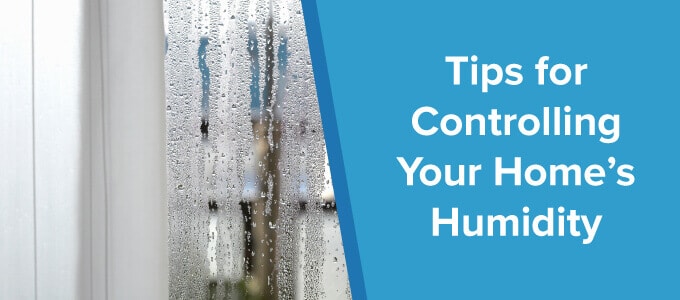
Table of Contents
Do You Have Excessive Humidity in Your Home? | Why Is Your House So Humid? | Benefits of Good Home Humidity Levels | How to Decrease Humidity in Your House | Things You Can Do Inside To Improve Humidity | Things You Can Do Outside To Improve Humidity
Dealing with excessive humidity is not comfortable or fun. It's even worse when there are higher humidity and moisture levels in your home. It can often feel warm, sticky, and just plain gross. But there's more danger behind it than just feeling bad. Higher humidity and moisture levels can be an extreme threat to your property, including the structure, surfaces, and condition.
Did you know, for instance, that excessive moisture can damage wood, paint, insulation, and siding? What about the fact that it's highly susceptible to allergens and pollutants like dust mites, mold, and mildew? All of those things can cause severe problems for your lungs, even more so if you suffer from allergies, asthma, and existing pulmonary ailments.
Energy Star states that ideal indoor humidity levels are between 30 and 50%. It's in your best interest to follow that recommendation. Keeping humidity levels inside your home manageable will improve your comfort, but it will also improve the air quality and reliability of your home.
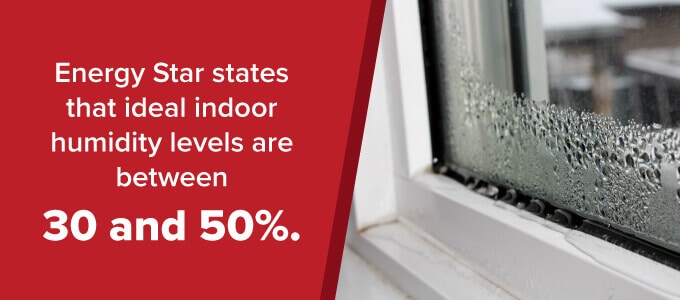
However, you may not know that the ideal humidity levels fluctuate from room to room and season to season. A bedroom requires about 50% relative humidity year-round, to help reduce dust mites and allergens. You can sleep better too by maintaining proper humidity levels, which should stay at a sufficient moist because it's much kinder on your mucous membranes.
Furthermore, although the ideal humidity levels are less than 60% in the summer, those numbers drop to 25% and 40% in the winter. Having higher humidity during colder months can cause complications too.
The problem is lowering humidity. How do you keep it manageable, and lessen it when it gets bad? What causes high humidity in a house?
We'll give you helpful tips to keep your home comfortable and humidity-free through the hottest days of Pennsylvania summer, and the rest of the year.
How Can You Tell If You Have Excessive Humidity in Your Home?
Of course, you can't walk around with a humidity or dew meter all the time. How can you tell when the humidity is too high inside your home? There are a couple of telltale signs like clammy skin, foggy windows, and a heavy yet warm atmosphere. But you can also smell mildew or musty odors when your home is much too humid, which comes from moisture buildup.
cooling services in central pa
Here, are several ways to check for high levels of humidity in your home:
- Look for visible condensation on cooler surfaces like windows, mirrors, pipes, and in your basement. If you do find it, feel and check the surrounding area to ensure the moisture is not spreading to walls and nearby surfaces.
- On the ceiling, you'll want to watch out for wet stains or crumbly stucco. You can often see moisture as discoloration, which can be tough to spot in certain lighting conditions.
- Do you see any peeling paint or hear floorboards creaking excessively?
- If you or any of your family members experience severe headaches, loss or shortness of breath, common allergy symptoms like wheezing, or a chronic cough then the humidity may be affecting your bodies.
- Check your home for the smell of mold and mildew; sometimes they may even have a smoky scent. If you've been inside your home for a long time, try leaving for a bit and coming back. You should be able to detect odors and smells better after you've had fresh air.
- Do any surfaces, including walls, floors, and shelves feel soft or moist?
- Do you see dark spots or discoloration?
While some of these signs, alone, may not indicate a problem with humidity, it's a safe bet that if you've experienced multiple things you should have your home checked.
Why Is My House So Humid?
Several factors contribute to the humidity levels within a home such as the design, construction and materials, vapor retarder use, insulation, and how airtight the property is. Of course, the surrounding climate and temperature also have a direct effect on humidity. In Florida, for instance, the average humidity inside a home is going to be much higher than that of one located in New England.
In hotter climates, such as in the south a home can also be more humid because of an oversized air conditioner. When an AC unit's capacity is much too large for a home, it cools too quickly and in short, ineffective cycles. This causes it to turn on and off frequently, allowing humidity to take hold. You see, the evaporator coil inside the AC helps act as a dehumidifier, by pulling moisture from the air. For that to happen, however, the air passing through the unit needs to have enough time. If your system is turning on and off too often, then nothing is done for the humidity of the air entering your home.
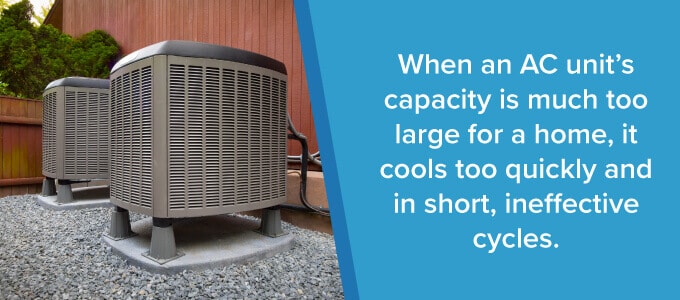
You can tell whether or not your AC is too large, by how often it runs and for how long. On the hottest of days, it will only run for about 10 to 15 minutes per cycle before turning off.
Learn more about our cooling services
What Are The Benefits of Good Home Humidity Levels?
As previously stated, pollutants and allergens are more prevalent in homes with higher humidity levels. So, having a moderately controlled home can have many health benefits on top of the comfort and convenience you'll feel. Have you ever been in weather that was so hot you were sticky and covered in sweat? It's not pleasant, and it's certainly not something you want to experience inside your home of all places.
You may also want to be aware that dry indoor air can be a problem during cold winter months, just as having too much humidity can be a problem. Click here to learn how to increase your home's humidity in the winter! You need a proper balance. Because dry air that makes it inside your home is never going to be more humid, it's going to stay dry. That will create an incredibly uncomfortable environment in your home, and can even cause nose bleeds!
Attic temperature and humidity levels are also important. Even though no one will be spending time in the attic or crawl spaces of your home, you don't want them too humid either.
Want to know how to control humidity in your home, and make it more manageable? Keep reading!
How to Decrease Humidity in Your House
There are many tools and strategies you can employ to reduce the humidity in your home. Remember, you'll want to know how to reduce humidity in the house in winter, as much as in summer:
- Dehumidifiers: Dehumidifiers are placed in basements most of the time, but you can get large-scale ones for an entire property. They work best when a room or area is sealed off, including all windows and doors. They remove moisture from the air but must remain away from walls and objects to allow for proper air flow. You'll want to learn how to reduce humidity without a dehumidifier too.
- Proper Ventilation: You want to make sure that areas, where moisture is present, are properly ventilated, such as the kitchen and bathrooms. Turn vent fans on and leave them on when there's moisture in the room. Get extra fans if you think moisture is causing issues. If you don't have any exhaust fans, you can crack a window or two.
- Air Conditioning Systems: Air Conditioning units don't just cool down the air inside a home. They also remove moisture and humidity. Just make sure the unit you have installed is the appropriate size for the square footage of your property.
- Humidity Monitors: You can buy humidity monitors at a local hardware store or online to check moisture levels inside your home.
- Weatherstripping: Weatherstripping around the doors and windows of your home creates an air tight seal to prevent cool or warm air from escaping, and excess humidity from seeping inside. They are especially necessary for warmer climates where it's humid outdoors.
- Caulking: Caulking works the same way as weatherstripping, only it's used to line surfaces and materials that may come into contact with moisture such as faucets, sinks, toilets, tubs, and more. Caulking is also used around windows and in seams.
- Insulation: Insulation, if you don't know, is used to retain heat and keep excess particles from entering a home. If the walls of a home are properly insulated — and they're not already moist — they will prevent cool and warm air from escaping or entering through gaps in the walls.
- Interior Adjustments: You can make several changes to the interior of your home which includes installing ceiling fans, regularly cleaning your AC ducts and filters, and more.
- Lifestyle Changes: Set the fan on your AC or HVAC unit to "auto" instead of "on." Also, try not to run the AC as often if you notice it's powering on and off for short bursts. Also, be sure to use the exhaust fan in bathrooms when you're showering, and keep the door open if you can.
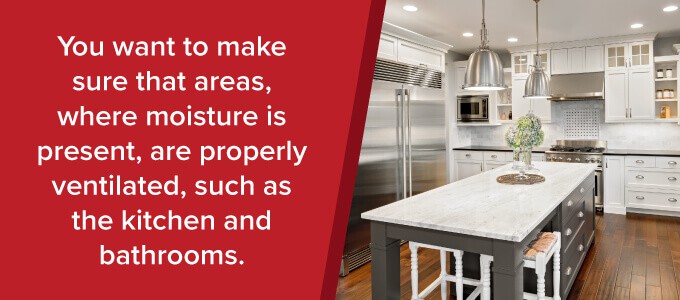
Things You Can Do Indoors to Deal With Humidity
Here are some quick tips for improving the humidity levels inside your home:
- Carpet is known to retain moisture, as do rugs. It may be a good idea to remove the carpet in your home and replace it with tile, wood flooring, or something else.
- Always ensure that pipes are insulated to prevent the moisture from sweating and condensation from spreading to nearby areas or surfaces.
- You can line windows with plastic film or storm coating to eliminate moisture and condensation. Also, be sure that weatherstripping and caulking are used both inside and outside the edge seams of a window. If you notice it's breaking down or deteriorating, you can replace it fairly easily or call a professional. Do so, sooner rather than later.
- Paint walls instead of using wallpaper or vinyl coverings. These materials can trap moisture inside and ruin the surface of the wall. It can also lead to mold growth, especially if the sticker or vinyl covers a large area.
- Make sure any and all crawl spaces are insulated with a plastic vapor barrier.
- If you have a basement, be sure there are no cracks in the wall and if there are repair them as soon as possible. You can also coat the underground walls with Xypex or Drylok to prevent excess moisture from seeping in.
- Take shorter or much cooler showers when it's time to get clean. Also, ensure that exhaust fans are always on.
- Make sure that your AC unit and climate control system is the appropriate size for your home. As we've said previously, if it's too large it can contribute to humidity buildup inside, as is true of a unit that's much too small. You can always reach out to a professional like Home Climates to assess your current system and help you determine if it's right for your home and family.
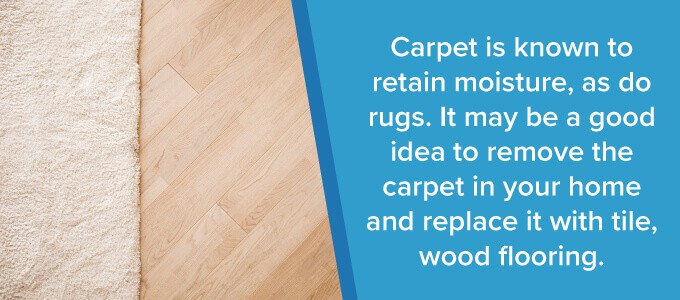
Things You Can Do Outdoors to Deal With Humidity
Here are some quick tips for things you can do outdoors, to improve the humidity levels inside your home:
- Ensure that any drainage ditches, gutters, or easements slope away from your home. This will prevent water from running down inside the foundation of your home or basement. It also helps prevent flooding when there is excess water buildup.
- Keep gutters and downspouts clean so that water can drain properly instead of building up.
- You can hire professionals to treat the foundation of your home with Hydroclay, a makeshift seal that absorbs and blocks water from entering a home. It's often used in basements to prevent leaks.
- Have your roof regularly inspected for loose shingles, cracks, and deteriorated flashings. Also, be sure to monitor all vents leading to the outdoors, such as your dryer vent. Over time they can break down and may need to be replaced or repaired.
- Install awnings or sloped ledges above windows and doors to ensure all water runs away from the opening.
Now You Know: Excess Humidity Is Bad
Having read through the entire guide, you know just about everything there is to know about excess humidity levels now. While you cannot consider yourself an expert or professional just yet, you have the knowledge to protect your home and your family. You know the answer to the question: how do I control moisture in my home?
Just remain conscientious that elevated humidity levels can damage your home, health, and comfort. It's always best to keep them moderate during any season, though the ideal levels will fluctuate.
If you suspect the humidity in your home may be too high for your liking — or your health — contact Home Climates today. We can help assess your home and offer the best solutions available. We will ensure that the humidity and comfort levels in your home are to your liking and that no damage has come to your property structural or otherwise!
How to Reduce Humidity in a Room Naturally
Source: https://homeclimates.com/blog/tips-controlling-homes-humidity